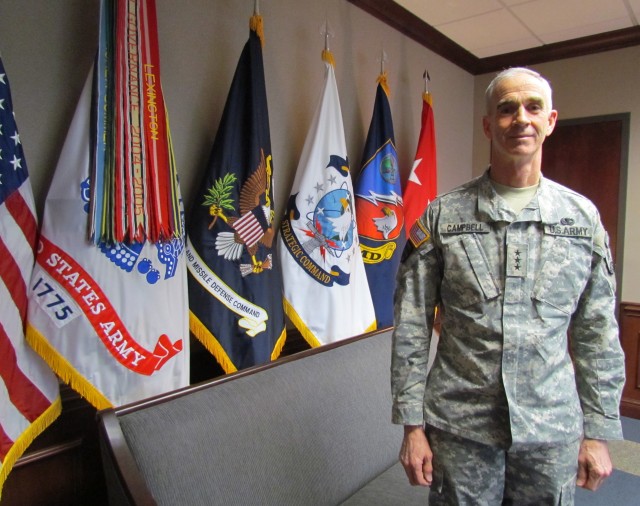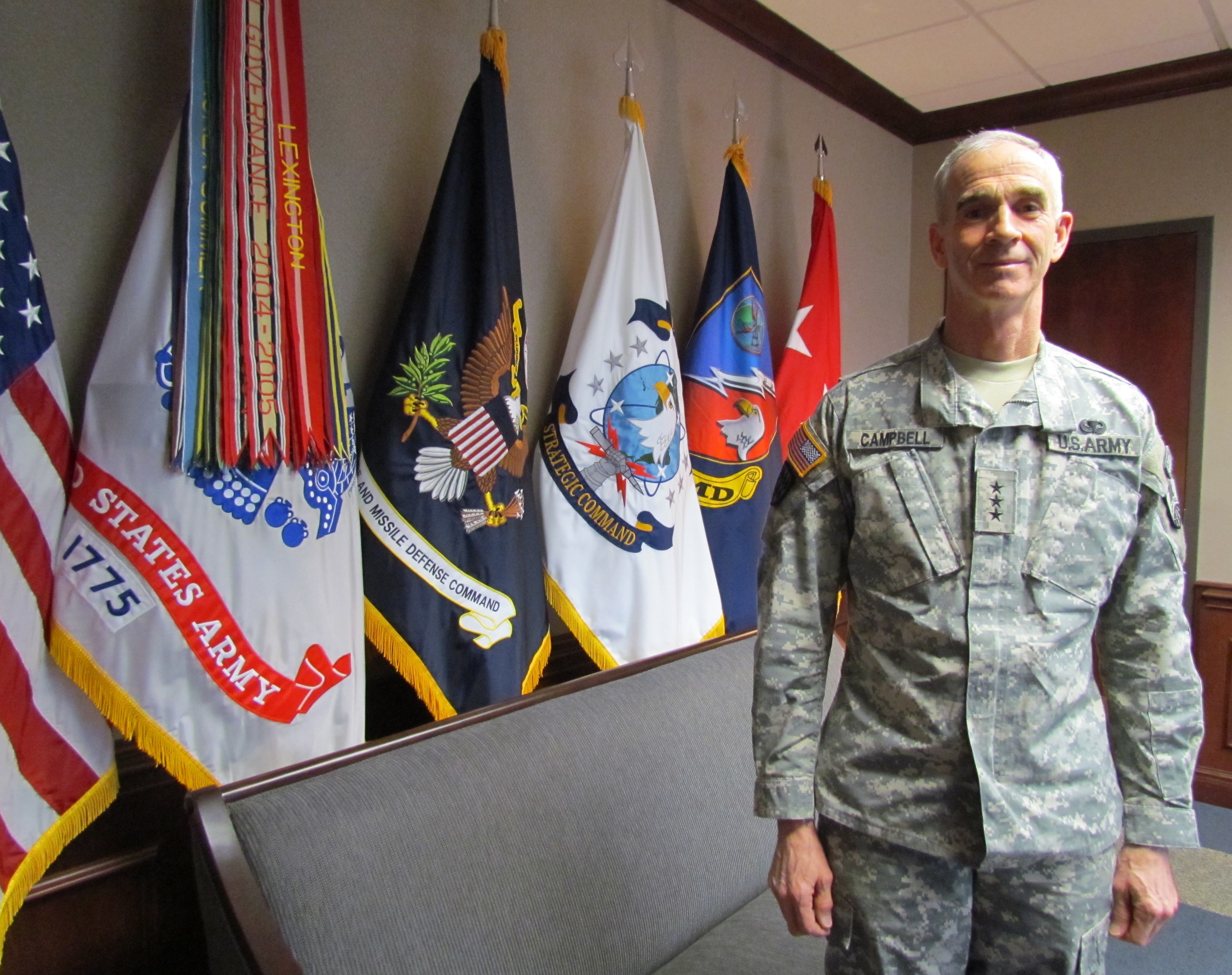
REDSTONE ARSENAL, Ala. -- For Lt. Gen. Kevin Campbell, the measure of a Soldier is found in the Army values - loyalty, duty, respect, selfless service, honor, integrity and personal courage.
Those are the attributes he has striven to emulate during 37 years as an Army officer.
But there is one attribute Campbell would like to add to his own personal list of Army values - gratitude.
"I have a lot of gratitude for what the Army has done for me," the commander of the Space and Missile Defense Command/Army Forces Strategic Command said. "I have gratitude for the people which I've gotten to work with over the course of the years and for a family who has supported me."
On Dec. 15, Campbell will hang up his active duty uniform for retirement. But he will carry those attributes with him throughout his post-retirement years. During a 2 p.m. change of command and retirement ceremony in Bob Jones Auditorium, Campbell will thank the Army for a challenging and interesting career, and turn over his leadership role to Lt. Gen. Richard Formica. Gen. Peter Chiarelli, the Army's vice chief of staff, and Gen. Kevin Chilton, commander of the Strategic Command, will be the reviewing officers for the change of command.
"I hope I'm leaving this organization a little bit better postured for the future," Campbell said. "We've had some reorganization within the command and some re-equipping within the command that postures us better for today's wars and gives us better capabilities for tomorrow's wars. We provide a unique set of capabilities, particularly in the area of space."
Formica brings with him a lot of operational experience that Campbell hopes will continue to grow SMDC/ARSTRAT's operational role in supporting the combatant commands.
Campbell also hopes Formica will appreciate and benefit from the synergy at Redstone Arsenal created by co-locating key military leaders with similar missions together.
"This organization is here for the long haul," Campbell said. "One of the principle reasons we are here is because organizations such as the Missile Defense Agency and the Program Executive Office for Missiles and Space are here. Being co-located at Redstone allows us to work with each other, to collaborate on a future that is just beginning. I see a very promising future for this organization."
SMDC/ARSTRAT employs about 1,000 civilians and 900 military worldwide in its quest to provide dominant space and missile defense capabilities for the Army and to plan for and integrate those capabilities in support of the Strategic Command and the Geographic Combatant Commanders missions.
The organization has evolved with the Global War on Terrorism, deploying expert teams into Iraq and Afghanistan "that work directly with operation officers within major units," Campbell said. "Those teams bring a special skill set to theater that gives those units an advantage."
But while his work force focuses on space and missile defense research, development and deployment, Campbell has concentrated his efforts on ensuring that SMDC/ARSTRAT grows its expertise and skill set so that the organization remains relevant and essential to the war fight.
"The people of any organization always come first ... I hope my legacy is that I had a general concern and care for what the people were doing, for their professional development, for creating the best work environment possible," he said.
"The interaction with leaders at all levels of the command has been rewarding for me. I have enjoyed the opportunity to discuss with them how they think we should evolve into the future. Learning about what their challenges are and then trying to help them with those challenges has been rewarding for me. Developing people is the essence of this job."
A good leader within an organization has a "genuine care and concern for those who they are charged to lead. They are a good communicator, approachable and have some source of vision of the organization," said Campbell, who has relied on his experience, training and mentor advice to guide his management philosophy.
He has also focused efforts on assisting the Army's wounded warriors, taking that assistance beyond an appreciative handshake or an event in their honor.
"It became clear to me early on that we need to do more for wounded warriors, that we need to meet them more than halfway, and maybe even three-fourths or seven-eighths of the way," he said.
"I felt we needed to bring them on board and give them an opportunity to start a career. We had to create opportunities for them and I engaged our leaders at all levels to do this. Otherwise, they wouldn't have a shot into our organization."
Throughout the four years he has served as the commander of SMDC/ARSTRAT, Campbell has led and sat in on plenty of meetings in regard to his organization's capabilities, its growing influence around the world and the threats the command must aid the U.S. in addressing.
"There have been plenty of challenges, and I'm always trying to ensure what we're doing is going to support the war fighter," he said. "We must work through whether research and development or current operations is relevant. Will the capability we can add make a difference to the war fighter'"
SMDC/ARSTRAT's relevance starts with employees who have a "sense of duty, sense of purpose and are focused on the organization's mission. They are dedicated and have integrity. They work to complete the mission, not to the clock, and that's true of any profession," Campbell said.
Campbell's dedication to the Army mission began toward the end of the Vietnam era when he graduated from Worcester State College in Massachusetts and followed his brother into the commissioned ranks.
"My brother served in Vietnam and I felt I needed to do something as well," he said. "I sought out ROTC in college and I was commissioned in 1973. But the plan was three and out. I was committed to complete my three-year obligation as a regulation Army officer -- three years and no months, no days and no minutes. I've missed that goal for 34 years."
His first assignment -- as an artillery team commander in Germany - led him on a mission that took him way beyond that initial goal.
"It was really challenging," he said. "But working with Soldiers - that really captured me and I found great value and personal satisfaction in that. All my assignments have been good, and I had many great assignments through my mid-career. The assignments were extremely challenging, extremely rewarding."
One such assignment - working with the joint staff in Washington, D.C., as a political military staff planning officer - involved Campbell in studying and strategizing a policy for Eastern Europe and Bosnia prior to the U.S. deploying troops to Bosnia in the mid-1990s.
"We often briefed the chairman and the vice chairman of the Joint Chiefs of Staff on the challenges we had in Bosnia," Campbell said. "We were working on how to attack this problem. What is our strategy' How should we approach it to make it successful for the U.S.'"
Throughout his career, this airborne Ranger sought out the tough assignments, the positions that challenged his leadership ability.
"Many of the good jobs are the hard jobs," he said. "They really train you well for moving into positions of higher responsibility, and they give you the momentum to keep going."
One such job at mid-career was especially difficult for Campbell because it wasn't what he considered the right job for him.
"The Army put me in a position that I didn't think was good in terms of my development," Campbell said. "At first, I was doing whatever I could to work my way through it and out of it. But then I made up my mind that although the job didn't live up to my expectations, I was going to do the absolute best in those things that were my tasks."
Making the most of an assignment - whether military or civilian - leads to success, he said.
Although fighting wars in Iraq and Afghanistan have taken a toll on the Army, Campbell has also seen positive fundamental change resulting from experiences in these war theaters.
"Over the past decade, we've grown a generation of leaders and Soldiers who are very creative," he said. "Years ago, the Army focused on telling its Soldiers what to think. Today, I think the Army is more focused on training Soldiers and leaders on how to think through complex situations and how to conceptualize the situation so they come up with the right solution. Today's Army needs Soldiers who are adaptive and flexible, and not simply tied to root memory."
A Soldier's Soldier, Campbell said an Army career should always be based on the foundation that's built for each Soldier in basic training.
"In this profession, you really have to adhere to the Army values and warrior ethos. No matter what your career path is, you never stray from those values," Campbell advised. "Beyond that, seek out hard jobs where you can make a greater contribution to the Army, and they will allow you to advance."
Campbell's success and advancement meant many assignments that took him away from home.
He relied on wife, Kathy, to keep life at home on an even keel as she raised their two children.
"It's a team sport. You can't do this alone," he said. "Your spouse has to be on the team because you are absent more than you are present. Kathy gave me the support that enabled me to do what I felt I had to do and a lot of times that meant being away from her and the kids."
The couple have not firmed up their retirement plans, and are considering making their home in Huntsville, Washington, D.C., or their home city of Boston. Church mission work may be part of Campbell's future plans.
"My faith has helped me through difficult times, challenging times," Campbell said. "It's given me a place where I have personally found strength. And my wife has certainly been an example to me of that."
As he says goodbye to his military career, Campbell is thankful for the way Americans view today's servicemembers.
"I think Americans are getting it. They understand that the men and women serving this country - in uniform and civilian - are really putting aside a lot in their lives and making personal sacrifices to serve," he said. "It warms my heart that what we do really matters to the American people. And, in Huntsville, you can really see that. There is no better community in America for the military. You feel valued here. What we do here at Redstone and in the military is really valued by today's society."

Social Sharing